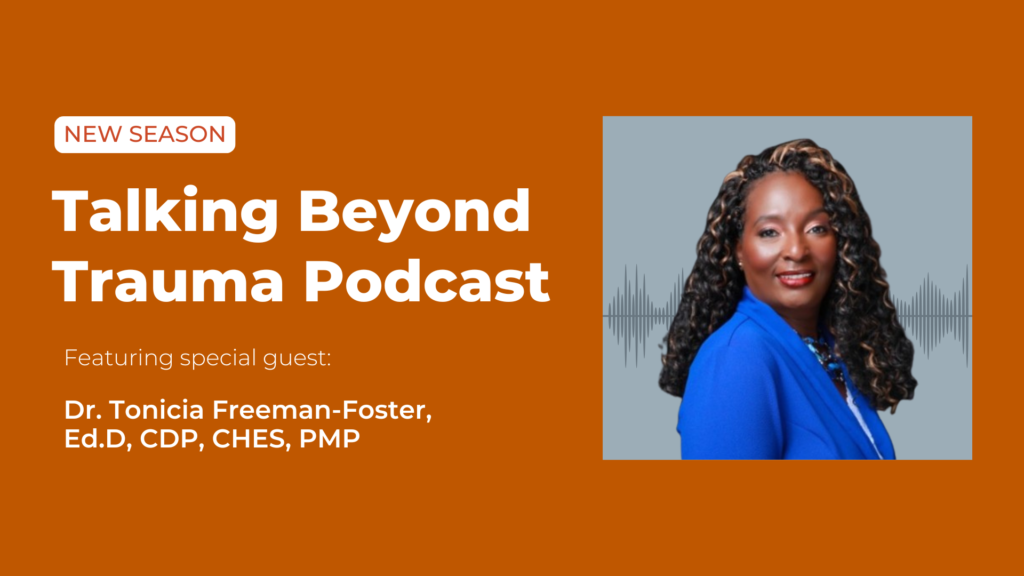
We’re excited to share the fourth season of Talking Beyond Trauma, where Dr. Tonicia Freeman-Foster, Co-founder and Principal Consultant at LEIDOSWEL, joins our host Mordecai Dixon. Dr. T ignites transformation in leaders, teams, and organizations through solutions-focused coaching, mentoring, and consulting.
Last season, Dr. Natalie Fikac was joined by Amanda Boquist to discuss maternal mental health.
In season four, Mordecai and Dr. T will focus on disproportionality in mental health and trauma, answering questions such as:
- What is disproportionality, and how is it realized?
- Can providers and community members rethink how they consider systems to make measurable improvements in the lives of people disproportionately impacted by them?
- What are the characteristics of leaders who work with communities impacted by disparities?
- If there are systems in place to assure there’s access or no wrong door to services, why is there an issue with health disparity in communities of color?
- What are the current challenges in diagnosing without bias and judgment?
- And much more
A quick background on Talking Beyond Trauma
In March 2023, our team at the South Southwest Mental Health Technology Center Network (MHTTC) developed a new podcast centered around trauma for the Collaborative Conversations series.
Our team’s vision for the podcast was to talk about trauma in a simple way— without theories or research models. Each one of us experiences trauma differently, and it’s important to not only talk about trauma but also talk beyond trauma. That means sharing insights on wellness, building our skills, and broadening our understanding of how trauma works in our bodies and communities.
Talking Beyond Trauma addresses real hurt with real people having real conversations. Anyone can listen to this program and take something away that helps in their journey of wellness and recovery.
Why cover mental health disparities?
According to the Centers for Disease Control and Prevention, health disparities are preventable differences in the burden of disease, injury, violence, or opportunities to achieve optimal health experienced by populations disadvantaged by their social or economic status, geographic location, and environment.
Many populations experience health disparities, including people of color, people with disabilities, women, the LGBTQIA+ community (lesbian, gay, bisexual, transgender, queer, intersex, asexual), and people with limited English proficiency.
Here are a few key points from the American Psychiatric Association:
- African Americans often receive poorer quality of care and lack access to culturally competent care.
- Only one in three African Americans who need mental health care receives it.
- Approximately 21% of single-race American Indians and Alaska Natives lacked health insurance coverage in 2015 as compared with 9.4% of the general US population who lacked health insurance coverage.
- LGBTQ individuals are 2.5 times more likely to experience depression, anxiety, and substance misuse compared with heterosexual individuals.
- Hispanics are more likely to report poor communication with their health provider. Several studies have found that bilingual patients are evaluated differently when interviewed in English as opposed to Spanish and that Hispanics are more frequently undertreated.
Understanding health disparities among underserved and oppressed communities is crucial for advancing mental health care because they often reflect deeper, systemic issues that affect overall well-being.
Historical trauma, such as the legacy of colonization, slavery, and systemic discrimination, has long-lasting impacts on mental health that persist across generations. These experiences can lead to increased vulnerability to mental health issues, while simultaneously creating barriers to accessing appropriate care.
About Dr. Tonicia Freeman-Foster and Mordecai Dixon
Dr. Tonicia Freeman-Foster (she/her)
Dr. Tonicia Freeman-Foster, Ed.D, CDP, CHES, PMP (also known as Dr. T) is a national trainer, consultant, innovative strategy partner, mentor, and coach with over 20 years of experience. She is the Co-founder and Principal Consultant at LEIDOSWEL.
Dr. T’s passion is eliminating injustices and inequities by assisting organizational leaders in understanding how their beliefs and actions impact the outcomes of their staff, clients, families, customers, and communities. She is committed to ensuring equitable resources, culturally engaging, and community-driven services for historically oppressed individuals and communities.
Check out her book “Navigating Rough S.E.A.S. – Soul Eroding Assimilation-Forcing Systems: A Playbook for Navigating Workplace Trauma and Reclaiming Power, Wellness, and Joy,” which sheds light on the unique challenges many Black women leaders face in the workplace.
Mordecai Dixon (he/him)
Mordecai Dixon, M.A. has worked in human services with diverse populations for thirty years. He is a masters level graduate with a specialization in Organizational Psychology.
Mordecai is a Senior Administrative Program Coordinator at the Texas Institute for Excellence in Mental Health. He has hosted multiple seasons of Talking Beyond Trauma, including sessions on workplace culture and mindful self-compassion.
Mordecai has dedicated his career to improving service outcomes of organizations and the people impacted by services. His goal is to enhance the capacity of organizations, at all levels, serving those identified as most vulnerable.
Start listening to Talking Beyond Trauma season four
You don’t want to miss Mordecai and Dr. T’s discussion on the impact of historic trauma in the development of mental health services.


Leave a Reply